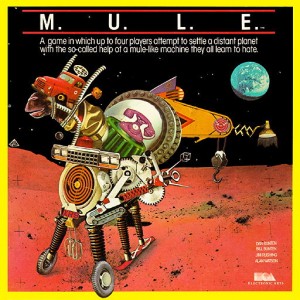487th played so far
Genre: Strategy
Platform: Various
Year of Release: 1983
Developer: Ozark Softscape
Publisher: Electronic Arts
After going on about how Exile (and other games) unnecessarily apply arcade-level coin gobbling difficulty to home games, it’s nice to shift gears to a game that won’t. While the arcade route is probably the biggest for home video games, another branch was that of university developers, who may have had to deal with time shares and machines they didn’t always have access too, but where money per play wasn’t an issue. Instead it could focus on slower games, often strategic and (early on) turnbased.
M.U.L.E. seems to come from this direction, a strategy game made for home computers, which even includes and encourages multi payer games. That should be fun for sure.
Our Thoughts
M.U.L.E. was an interesting game. I’m not sure whether I really got a handle on the mechanics – the need for the different resources never became that clear to me. Even though I started making some associations with food and beyond, it took a wiki to point out to me why certain things weren’t going well for me.
The game comes down to basic resource management. You need to mine a certain resource, but to be able to do that you need to collect food and energy to help you do so. Despite its turn based nature, you’re still time pressured to do so – earning a claim of land requires you to press your button for it first, which makes it a stand off until it gets closer to time, as long as you’re not the first there. Then, during the maintenance and updating phase, where you put different buildings on your plot and can go scavenging, you only have limited time to do your tasks (limited, I learned later, by one of the resources).
Then there’s the trading phase, where you can buy from other players or sell to them or the general bank (which has a better name, but yeah). It’s a way to get some money back, but heavily comes down to have likely others are to want to play.
It’s just deep enough to stay interesting without getting complex, which is really something to appreciate. I ended up playing against bots, which worked well enough, but I can see the discussions you can have during the game as you try to make deals and influence each other being even more interesting.
Final Thoughts
I’m not sure I was playing this game in the right context, but even against bots the multiplayer aspects of this game came out quite well. It’s a nice strategy game, still close to a board game, but offering a variety and group of options that a physical game couldn’t handle as easily.
